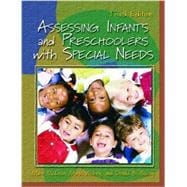
Note: Supplemental materials are not guaranteed with Rental or Used book purchases.
Purchase Benefits
What is included with this book?
| Assessment and Its Importance in Early Intervention/Early Childhood Special Education | |
| Tests and Test Development | |
| Procedural Considerations in Assessing Infants and Preschoolers with Disabilities | |
| Family Diversity, Assessment, and Cultural Competence | |
| Identification and Referral | |
| Screening and Assessment of Sensory Functioning | |
| Assessing Family Resources, Priorities, and Concerns | |
| Assessing Childrens' Environments | |
| Functional Behavioral Assessment in Early Education Settings | |
| Assessing Cognitive Development | |
| Assessing Motor Skills in Infants and Young Children | |
| Assessing Communication Skills | |
| Assessing Social Competence | |
| Assessing Play Skills | |
| Assessing Adaptive Behavior | |
| Using Assessment Information to Plan Intervention Programs | |
| Monitoring Childrens' Progress and Intervention Implementation | |
| Author Index | |
| Subject Index | |
| Table of Contents provided by Publisher. All Rights Reserved. |
The New copy of this book will include any supplemental materials advertised. Please check the title of the book to determine if it should include any access cards, study guides, lab manuals, CDs, etc.
The Used, Rental and eBook copies of this book are not guaranteed to include any supplemental materials. Typically, only the book itself is included. This is true even if the title states it includes any access cards, study guides, lab manuals, CDs, etc.